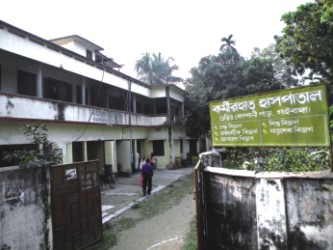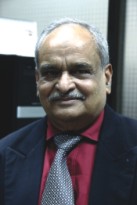Making a Difference
Reversing the Curse
Elita Karim
 |
Karmirhath Hospital |
"My father is very old and is not able to earn regularly because of ailments,” says 17-year-old Sumona. “We were under a lot of pressure at one time, since I have two little brothers going to school. I myself was in class 10. We could never manage enough to run the household and thus I had to drop out of school. Then I joined the Anti-Dowry programme and learned to stitch and use the machine as well. Today I earn close to Tk 3,000 a month. On Eid-ul-Adha, I earned close to Tk 5,500. Now I can support my family and pay my brothers' school fees as well.” The Anti-Dowry project Sumona is talking about is one of the most successful projects of Karmirhath, a non-profit organisation located in Gaibandha. The project was established to help eliminate the practice of dowry, which is still common in rural Bangladesh. Today, Sumona and other young teenagers like her are independently earning a good amount every month and supporting their families.
“This pilot project was established to save the poor families from the curse of dowry,” says Abdus Sobhan, the President of Karmirhath. “We completed this project in November 2009 with financing from our regular donor, the North American Bangladeshi Islamic Community (NABIC). A batch of eighteen girls aged from 14 to 16 received lessons in basic education, health care and training on cooking, sewing, embroidery, cattle and poultry rearing. At the end of their 6-month training, each girl was provided with a foot-operated sewing machine and a total of TK 2,000 to start their own business.” According to Sobhan, while the training was going on, five of the girls were married without dowry, thus fulfilling the objective of this programme making the girls independent.
Karmirhath was established in 1985 with the help of the local people in Gaibandha. It serves a population of about 2.5 million inhabitants, covering also the adjoining districts of Bogra, Rangpur and Kurigram. These areas are often visited by floods causing serious damages to crops and homesteads. The organisation aims at raising the socio-economic status of the poor, downtrodden and the less privileged people in the society by providing affordable health care, mobility to the physically disabled and training to the needy.
 |
| Abdus Sobhan |
The projects of Karmirhath run entirely on private donations. Some of the projects are the Karmirhath Hospital, free distribution of wheelchairs, sports complex for the schools and the food rehabilitation project. Abdul Wahid Mia, a local philanthropist has been a major contributor since the inception of the organisation. The other major donors are NABIC, who, besides financing three on-going major humanitarian projects, has so far helped the organisation buy costly equipments for the hospital as well. In 2005, Col. (rtd) M Akbar, who lives in the USA and Sobhan worked hard to get favourable attention from the US-based Free Wheelchair Mission who donated wheelchairs for free distribution among the poor and physically disabled people of Bangladesh. In recent years, Col. Akbar has been more active in the overall development of Karmirhath. A group of young men residing in the USA, under the name of SPANDAAN-B bears the cost of the Children Care Department. The local people also contribute considerably in Karmirhath's Zakat Fund. "Karmirhath is entirely dependent on contributions/donations from individuals and organisations to run its different operations,” says Col Akbar.
18-year-old Shammi earned around Tk 3,700 on the occasion of Eid-ul-Adha. After completing her course at the Anti-Dowry programme in Karmirhath, she says that she is now much more relaxed and feels secure. “Even now I am earning around Tk 200 every other day by stitching blouses and doing other kinds of sewing work for the people living around. My family is very happy because of the financial support that I can give them as well.” Now that the first batch of teenage girls have successfully graduated from the programme, more and more poor parents in the area are now thinking about sending their daughters to the institution. According to Sumona, many girls here do not have much to do after getting into higher secondary school, instead of getting married. “That is why I think it is better if they learn to make a practical living instead,” she says.
 |
 |
| One of the 18 trainees receiving her certificate and a sewing machine. |
Poor disabled people in their respective wheelchairs at Gaibandha in 2009. |
Yet another project which gained a lot of popularity is the wheelchair distribution project. “Thanks to the Free Wheelchair Mission (FWM), USA, Karmirhath has so far distributed 6,600 wheelchairs free of cost in 48 districts since October, 2006,” says Sobhan. “The donor has assured us to give as many wheelchairs as we need.” According to Sobhan, Bangladesh has roughly around 9 million physically disabled people who need wheelchairs for mobility. “The wheelchairs seem to have changed the lives of thousands of poor and the disabled in Gaibandha.”
In a country like Bangladesh, areas like Gaibandha are often ignored, but are prone to plenty of natural disasters. Initiatives taken like the Karmirhath have definitely changed lives for the better and more such projects must begin in other rural areas of the country.
One can send their donations to Karmirhath Hospital, David Company Para, Gaibandha or contact Abdus Sobhan, President of Karmirhath at 01714-088888.
Copyright
(R) thedailystar.net 2009 |
